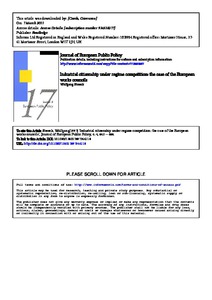Industrial citizenship under regime competition: the case of the European works councils'

Journal of European Public Policy
1997
4
4
643-664
EU law ; European works council ; labour relations ; social policy ; workers representation
Workers participation and European works councils
English
Bibliogr.
"As integrated Europe will not turn into a federal state, rights of citizenship, including industrial citizenship, remain nationally based. The article explores some of the consequences of this for social policy, at both European and national level. For empirical reference, it reconstructs the evolution of European Union legislation on workplace representation, in particular its movement in two decades from company to labour law, from harmonization to co-ordination of national systems, from legal prescription to voluntaristic bargaining in the shadow of the market, and from a project of integrated European citizenship rights to the protection of the integrity of national systems. The article shows that national fragmentation of public power in an integrated economy, however internationally co-ordinated, exposes advanced national versions of industrial citizenship to economic competition. While thereby pressuring national systems to lower their standards, it even falls short of affording non-nationals equal rights in national systems. "
Digital
The ETUI is co-funded by the European Union. Views and opinions expressed are however those of the author(s) only and do not necessarily reflect those of the European Union or the ETUI.